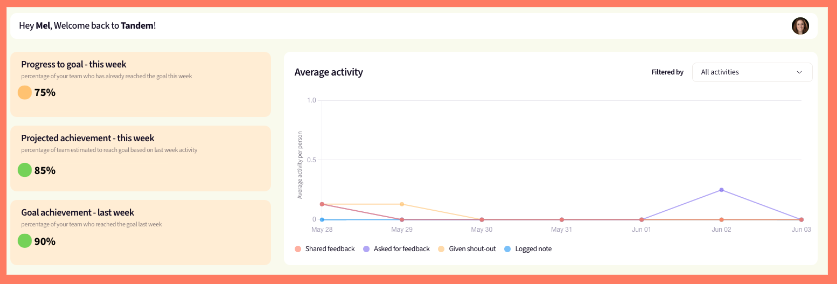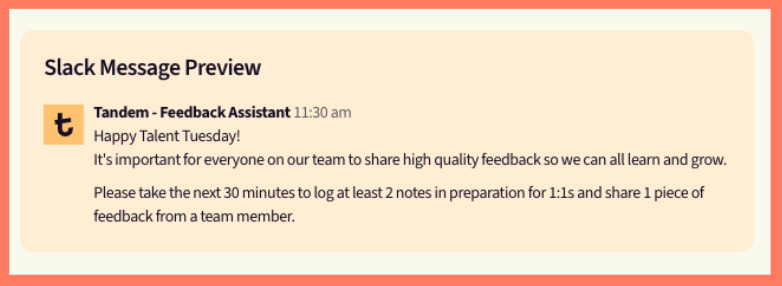Training Isn’t Enough
One common tactic to get a new habit going is training. However, even the best training out there isn’t enough for consistent, ongoing behavior change.
Training is great for raising awareness of what great feedback looks like and teaching the necessary skills. It can show people the right format, get them bought in on the importance, help them discuss blockers and troubleshoot sticking points. However, knowing how to do something and actually doing it regularly are two very different things. People might understand the importance of giving feedback and even know how to do it effectively, but without support, modeling and accountability, this knowledge can quickly fade. This leads us to the next point.
No Champions
Another issue is the lack of champions modeling the behavior consistently. For people to want to change their behavior, they need to see it as an “ideal” behavior—something that people they look up to do. Managers and team leaders are great influencers and champions. They are in front of their teams often. They are often looked up to in an organization for their expertise and guidance. And feedback is an actual expectation of their role!
If managers and leaders are not giving regular feedback, it’s unlikely their team will see feedback as a priority. Teams are really good at sniffing out what really matters. And they do this by watching the behaviors (not just the words) of their leaders. Leaders must lead by example, showing that feedback is not just a one-time training event but a continuous part of the workplace culture. When team members see their managers and peers regularly giving and receiving feedback, they are more likely to adopt this habit themselves.
Lack of Accountability and Expectations
There also needs to be a clear expectation with accountability around the feedback new behavior. The behavior has to become average and expected in the organization in order for it to become normalized. Everyone does it, and everyone is held accountable to it. Tandem can support your organization by helping you set a feedback activity goal where you can measure and hold people accountable. That which gets measured gets done!

This means setting clear goals and expectations for feedback. For instance, you could set a goal that each team member gives feedback to at least one teammate each week. Regular check-ins and reviews can help ensure everyone is following through. Creating a culture where feedback is expected and routine can help solidify this new habit.
Not Enough Time and Consistency to Form a Habit
Finally, new habits take time and repetition. Research shows it takes up to 60+ days of consistency to create a new habit! This means patience and persistence are key.
Implementing a new habit like regular feedback requires continuous effort and reinforcement. Regularly remind your team of the importance of feedback, celebrate when people engage in the new behavior, and provide ongoing support and training. Over time, with consistent effort, giving feedback will become a natural part of your team’s routine. Within Tandem, you can craft a feedback ritual to help remind your team to give feedback consistently.

Putting It All Together
While it might be challenging to establish new habits like feedback, it’s certainly possible with the right strategies. By recognizing the limitations of training and traditional tactics alone, ensuring role models are in place, creating clear expectations with accountability, and giving it time, you can help your team develop and stick to this valuable habit. Want help to get feedback going on your team? Join Tandem!


